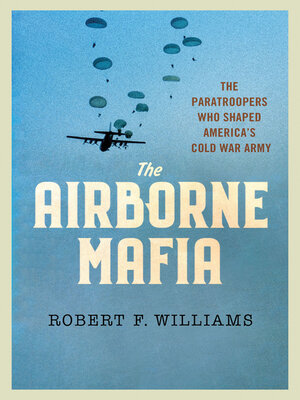The Airborne Mafia
ebook ∣ The Paratroopers Who Shaped America's Cold War Army · Battlegrounds: Cornell Studies in Military History
By Robert F. Williams

Sign up to save your library
With an OverDrive account, you can save your favorite libraries for at-a-glance information about availability. Find out more about OverDrive accounts.
Find this title in Libby, the library reading app by OverDrive.



Search for a digital library with this title
Title found at these libraries:
| Library Name | Distance |
|---|---|
| Loading... |
The Airborne Mafia explores how a small group of World War II airborne officers took control of the US Army after World War II. This powerful cadre cemented a unique airborne culture that had an unprecedented impact on the Cold War US Army and beyond.
Robert F. Williams reveals the trials and tribulations this group of officers faced in order to bring about their vision. He spotlights the relationship between organizational culture, operational behavior, and institutional change in the United States Army during the Cold War, showing that as airborne officers ascended to the highest ranks of the army they transmitted their culture throughout their service in four major ways—civil-military relations, preparation for potential atomic combat, helicopter airmobility, and strategic response forces.
Experiences of training and commanding airborne divisions in World War II led these men to hold sway in army doctrine by the mid-1950s. Dominating institutional thought and imparting their values, beliefs, and norms throughout the service they enjoyed a special privilege within the group culture. Williams demonstrates this impact, privilege, and power by focusing on the paratrooper triumvirate of Matthew Ridgway, Maxwell Taylor, and James Gavin and the lasting impression they made on how the US Army fought.
The Airborne Mafia illuminates the power subcultures can have in changing their parent cultures over time, particularly one as set in its ways and as large as the US Army. With a deft touch, deep research, and an unwavering eye for the human stories behind organizational change, Williams helps explain the existence and importance of the paratrooper mystique that remains within the military still today.







